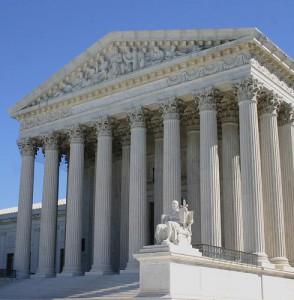The 5th Anniversary of Citizen’s United: A Wake-up Call to America

Today marks the fifth anniversary of the Supreme Court’s infamous Citizen’s United ruling, a decision that has come to symbolize the issue of corporate power in American politics. Controversy erupted immediately after the ruling was announced, and even President Obama joined the chorus just days later to scold the high court justices as they sat before him in the audience at his 2010 State of the Union address. Cries of “Corporations are not people!” and “Overturn Citizen’s United!” have proliferated ever since, especially in progressive circles, though notably with little impact on actual policy.
Given the intense reaction of many to Citizen’s United, one might have thought that the case somehow changed the nature of power and politics in America. In fact, however, Citizen’s United can best be understood as a decision that made a terrible situation just a bit worse. Truth be told, the influence of money in American politics was already out of control long before the court issued the 2010 decision, as was the problem of corporate power in general.
The Supreme Court had held since 1976, for example, in the case of Buckley v. Valeo invalidating post-Watergate campaign finance regulations, that money is speech under the First Amendment. This, combined with the fact that the wealthy and powerful wanted to stay that way, helped ensure that most subsequent campaign finance efforts were modest. As such, it shouldn’t be surprising that the cost of winning federal office had been rising steadily for many years before the Citizen’s United ruling.
Moreover, even setting aside the issue of clean and fair elections, the troubling influence of corporate power in American society has been pervasive for generations, again long before Citizen’s United. Many were upset with Defense Secretary Charles Erwin Wilson when he quipped at his confirmation hearing in 1953 that what’s good for General Motors is good for America, and vice versa, but most observers realized that his only mistake was his honesty. We all know that corporate dominance has been the reality in American society for as long as any of us can remember.
Fictional Personhood
The idea of corporations as people did not begin with Citizen’s United, and in fact is inherent in the corporate concept. Etymologically, the word corporation derives from the same roots as the word corpse, meaning a corporation is intended to be a body, or fictional person, created by the law. Thus, like a person a corporation can sue and be sued, enter contracts, buy and sell property, and perform other business transactions.
But just because corporations are legally intended to be a fictional kind of person, that does not mean that they were intended to have legal rights and political power anywhere near what they enjoy in America today. In fact, historically corporations were seen as decidedly unnatural, dangerous, and requiring most stringent regulation.
Conservatives today suggest that unrestrained corporate power is consistent with free enterprise and democracy, but these claims are rebutted by the facts. “What America needs is not Robin Hood, but Adam Smith,” presidential aspirant Rand Paul has declared on numerous occasions. But Paul’s libertarian economic positions—which would dismantle government so that corporations can exert even more influence—are totally inconsistent with the theories of Smith, the eighteenth century Scotsman author of Wealth of Nations whose name has become synonymous with free enterprise.
In Wealth of Nations, Smith made it clear that he was sharply opposed to the corporate model even on a small scale, saying it was improper to separate ownership from management. Indeed, any fair reading of Smith would conclude that he would be aghast at even the existence of huge publicly traded, multi-national corporate interests—let alone the degree of influence the wield today. (Indeed, perhaps Paul is right—maybe we do need more Adam Smith!)
Partly because corporations were viewed with so much skepticism at the time of America’s founding, they were almost non-existent at the time, and to the extent that a few did exist they were nothing like the corporations we see today. A special act of the crown or the legislature was needed just to create a corporation back then, and such permission was granted only on a showing that the unique form of business organization was needed to perform a high-risk function in the public interest, such as building a canal or a bridge, or transporting goods over the high seas. Once they were created, their activities were tightly regulated.
Yesterday and Today
Compare this to today’s environment, where multinational corporate interests effectively control the apparatus of government. Non-existent at the time of the founding, they now largely dictate how laws are made and administered across the nation. Almost all the lawyers and lobbyists in Washington—and there are loads of them—work for corporate interests, and of course this was the case long before the Roberts court issued its Citizen’s United ruling.
This is why cries to “overturn Citizen’s United” hardly begin to address the level of change needed to reverse corporate domination of American society or clean up the electoral process. Citizen’s United removed some restrictions on corporate electioneering, but it would be simply inaccurate to suggest that corporate influence was even close to under control before the decision.
When the framers declared that people are endowed with inalienable rights, they didn’t mean corporate people—they meant flesh-and-blood humans. Today’s protestors are correct when they object to the extent of corporate power, but getting that power under control involves much more than overturning Citizen’s United. A constitutional amendment expressly limiting corporate power and allowing campaign finance regulation, such as that proposed by Move to Amend, is what is needed.
Regardless of the jurisprudential significance of Citizen’s United, the ruling certainly woke people up. The question is whether, now awakened, real human citizens have enough political will to fight for their own interests.
